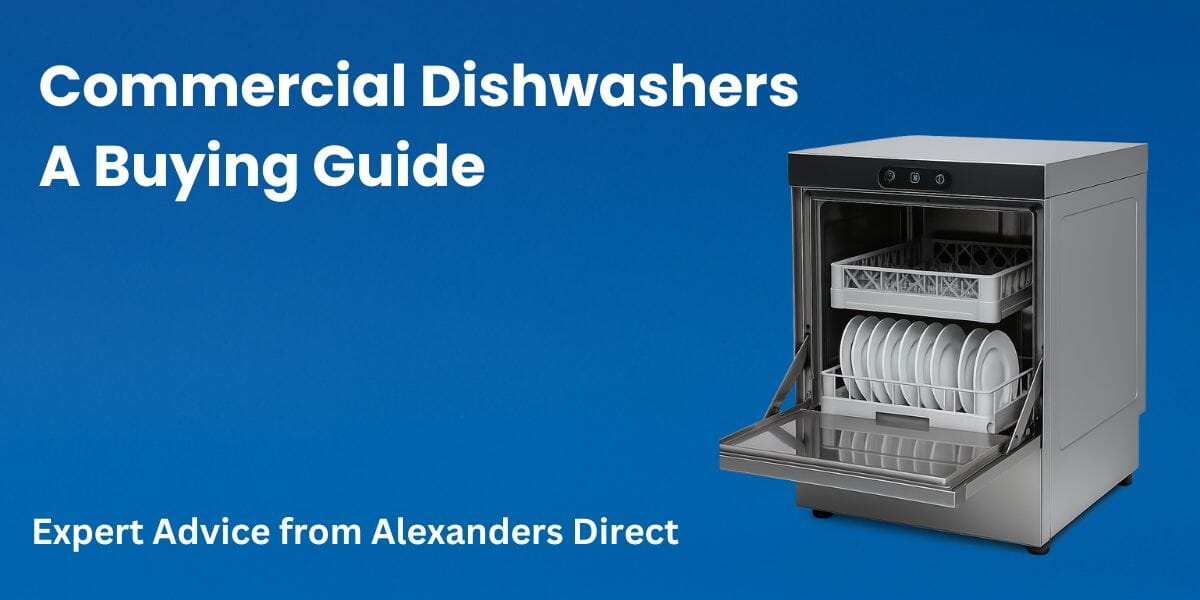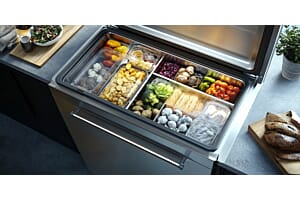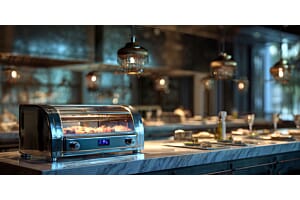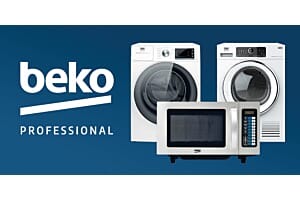
April 15, 2025
Best Commercial Dishwashers for Busy Kitchens in 2025 – Expert Picks
When your kitchen is moving at full speed, the last thing you need is a bottleneck at the sink. Whether you’re running a busy restaurant, café, or a school kitchen preparing hundreds of meals a day, a commercial dishwasher is one of the most important investments you can make.
But with dozens of models on the market – from undercounter dishwashers to high-capacity passthrough systems – how do you know which one will really keep up?
At Alexanders Direct, we’ve helped thousands of UK catering businesses find the right dishwashing solution. In this guide, we highlight our top recommended machines for 2025 and explain exactly what to look for when buying.
Get expert advice and make confident choices with our full range of Commercial Catering Equipment Buying Guides . Discover tips, comparisons, and top recommendations – all in one place.
Live Chat | Call Us | Send a Message
Top Commercial Dishwashers for 2025
DC SD50 Standard Range Undercounter Dishwasher
- Cycle Time: 3 minutes
- Capacity: 18 plates per cycle
- Why we recommend it: A compact, no-fuss dishwasher ideal for cafés, pubs, or kitchens with limited space. The insulated cabinet reduces heat loss and noise, while the self-draining pump improves hygiene.
- Best for: Smaller venues needing fast, consistent results without overcomplicating things.
DC PD50 Premium Range Undercounter Dishwasher
- Cycle Time: 2–3 minutes
- Capacity: 18 plates per cycle
- Why we recommend it: This premium undercounter model includes a built-in water softener, drain pump, and break tank – a complete package for areas with hard water or stricter hygiene rules.
- Best for: Businesses in hard water regions or those upgrading from a basic dishwasher.
DC PD1300 Premium Range Passthrough Dishwasher
- Cycle Time: 1, 2, or 3 minutes
- Why we recommend it: This high-throughput machine is perfect for kitchens needing speed and volume. The ergonomic hood design improves workflow, and the efficient rinse boiler keeps energy use down.
- Best for: Busy restaurants or hotels with large, frequent dish loads.
Prodis T1215PBT-3NT Heavy Duty Passthrough Dishwasher
- Cycle Time: 60, 120, 180 seconds or continuous
- Why we recommend it: Built to take a beating in even the most demanding kitchens. Deep wash tanks, rugged construction, and high-pressure rinse power make it a real workhorse.
- Best for: Large canteens, production kitchens, and anywhere washing doesn’t stop.
DC PD1350A CP Passthrough Dishwasher with Chemical Pumps
- Cycle Time: 1, 2, or 3 minutes
- Why we recommend it: Takes the performance of the PD1300 and adds built-in chemical dosing, saving time and hassle. Great for kitchens that need everything integrated into one reliable unit.
- Best for: High-volume kitchens with strict hygiene protocols and no time to waste.
What to Look for in a Commercial Dishwasher (2025 Buying Guide)
Choosing the right dishwasher isn’t just about power or price – it’s about finding the machine that matches your kitchen’s volume, space, and operational flow.- 1. Type of Dishwasher
Undercounter, passthrough, glasswasher, or utensil washer? Each suits different kitchen types and volumes.
- Undercounter Dishwashers – Ideal for cafés, pubs, or kitchens with limited space.
- Passthrough Dishwashers – Suited to high-volume service with integrated tabling for speed.
- Glasswashers – Best for bars and drink service, keeping glasses clean and streak-free.
- Utensil/Pot Washers – Built for heavy-duty cleaning of trays, pans, and prep equipment.
- 2. Cycle Time and Throughput
Most machines run 1–3 minute cycles. Look for 30+ racks per hour if you’re serving continuously or in sittings. - 3. Water Supply, Drainage and Hygiene Features
The right setup will depend on your plumbing, water type, and compliance needs.
- Water Softener – A must in hard water areas.
- Drain Pump – Needed when gravity drainage isn’t available.
- Break Tank – Required in many commercial setups to protect the mains supply.
- Rinse Boiler – Ensures hygienic wash at 82°C+.
- 3. Water Supply, Drainage and Hygiene Features
The right setup will depend on your plumbing, water type, and compliance needs.
- Water Softener – A must in hard water areas.
- Drain Pump – Needed when gravity drainage isn’t available.
- Break Tank – Required in many commercial setups to protect the mains supply.
- Rinse Boiler – Ensures hygienic wash at 82°C+.
- 4. Energy and Water Efficiency
Look for eco-cycles, double-skinned cabinets, and machines that use minimal water per cycle. These features lower running costs over time. - 5. Size and Installation
Always measure up. Consider tabling space, door clearance, and whether you need single or three-phase electric. - 6. Cleaning and Maintenance
Models with removable filters, accessible spray arms, and auto-drain options make daily maintenance fast and easy. - 7. Brand Support and Spares
Choose trusted brands with strong UK support, fast parts availability, and reliable warranties.
Quick Buyer Checklist
| Feature | Recommended | Why It Matters |
|---|---|---|
| Built-in Water Softener | Yes | Essential in hard water areas to prevent scale buildup and keep results spotless. |
| Drain Pump | Yes | Allows flexible installation when gravity drainage isn’t possible. |
| Break Tank | Yes | Protects mains supply – often required by law in commercial settings. |
| Double-Skinned Cabinet | Yes | Reduces heat loss and noise; improves energy efficiency. |
| Fast Cycle Time (<3 mins) | Yes | Keeps pace with busy service times and quick table turns. |
| EasyClean Filters | Yes | Speeds up daily maintenance and prevents blockages. |
| UK-Based Support | Yes | Faster servicing and parts supply when issues arise. |
Frequently Asked Questions
What is the best commercial dishwasher for small restaurants?
The DC SD50 and PD50 are excellent choices for smaller venues. Both are compact undercounter models with fast cycles and high reliability.Do I need a water softener with my dishwasher?
Yes – especially if you're in a hard water area. It protects internal parts, improves cleaning results, and extends machine life.What’s the difference between a commercial dishwasher and a glasswasher?
Dishwashers are designed for plates, cutlery, and cookware. Glasswashers use gentler cycles and are optimised for fast, streak-free results on delicate glassware.How much does it cost to run a commercial dishwasher?
Running costs vary, but modern machines are efficient – often using just 2–3 litres of water and low energy per cycle. They’re far cheaper than manual washing over time.Can I install a commercial dishwasher myself?
Professional installation is strongly recommended. It ensures correct setup of plumbing, drainage, electrics, and any legal hygiene requirements.Need Help Choosing the Right Commercial Dishwasher?
Not sure which machine is right for your kitchen? Our expert team is here to help. Whether you’re upgrading an old unit or starting from scratch, we’ll match you with the best dishwasher for your setup, budget, and daily demand.Need Help Choosing the Right Equipment?
Get expert advice and make confident choices with our full range of Commercial Catering Equipment Buying Guides . Discover tips, comparisons, and top recommendations – all in one place.
Live Chat | Call Us | Send a Message






